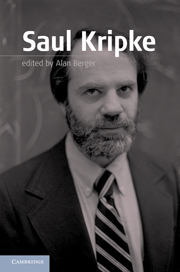Book contents
- Frontmatter
- Contents
- List of Contributors
- Introduction to Kripke
- Part I Naming, Necessity, and Apriority
- Part II Formal Semantics, Truth, Philosophy of Mathematics, and Philosophy of Logic
- 5 Kripke Models
- 6 Kripke on Truth
- 7 Kripke on Logicism, Wittgenstein, and De Re Beliefs about Numbers
- 8 Kripke on the Incoherency of Adopting a Logic
- Part III Language and Mind
- Part IV Philosophy of Mind and Philosophical Psychology
- Index
- References
7 - Kripke on Logicism, Wittgenstein, and De Re Beliefs about Numbers
Published online by Cambridge University Press: 05 June 2012
- Frontmatter
- Contents
- List of Contributors
- Introduction to Kripke
- Part I Naming, Necessity, and Apriority
- Part II Formal Semantics, Truth, Philosophy of Mathematics, and Philosophy of Logic
- 5 Kripke Models
- 6 Kripke on Truth
- 7 Kripke on Logicism, Wittgenstein, and De Re Beliefs about Numbers
- 8 Kripke on the Incoherency of Adopting a Logic
- Part III Language and Mind
- Part IV Philosophy of Mind and Philosophical Psychology
- Index
- References
Summary
Besides giving an overview of Kripke’s rather original proposal concerning these three topics, I intend to discuss the evolution of Kripke’s thinking about Wittgenstein. Kripke tells us that his thinking about the topics was “dialectical,” meaning that various initial ideas that he had were taken back, though they contributed to the “final synthesis.” I find a similar dialectical thinking in Kripke about Wittgenstein himself; Kripke has devoted much thought to Wittgenstein’s philosophy over the years, and I detect an evolution in his thoughts on Wittgenstein. In my opinion, in the present work – which is not presented as exegetical – Kripke succeeds best in penetrating Wittgenstein’s “mindset,” despite (what I see as) deep ideological differences of the kind which tend to impede sympathetic reconstruction.
I am not surprised at Wittgenstein’s fascination for Kripke, by the way. I have always marveled at the deep similarities in their approaches to philosophy. It is said that Wittgenstein compared philosophy to diving underwater: the deeper you go, the harder it gets. Kripke, too, castigates philosophers who are glib: “Now, I disagree with this attitude because what it means is that he confidently says that because he, Dennett, cannot think of the distinction it doesn’t exist. I mean, well that may be true of him, but at any rate in my own case I think I am a bit slower and that philosophy is slow and that if a distinction is used there may be something to be ferreted out there, even though the philosophers have not thought about it.”
- Type
- Chapter
- Information
- Saul Kripke , pp. 160 - 176Publisher: Cambridge University PressPrint publication year: 2011
References
- 12
- Cited by

